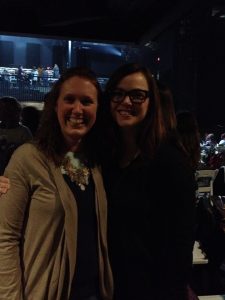A year ago I got off the plane in Austin, where it was only 2 degrees warmer than Ohio, for the first ever IF:Conference. This thing was an enigma, but I knew I wanted to be there – my favorite writers would be speaking and they were trying for a whole new thing when it comes to Christian women’s conferences. I hungered for a sense of authenticity, a newness within my familiar Christian world.

Alas, she will not be at IF this year, she’s too busy having another baby. Four babies. Who does that?!
At the first session Lori and I sat so close to the reserved tables we could have swiped their cell phones and programmed in our own numbers. We refrained. As Jen Hatmaker arrived in the 11th hour, she asked the general population of Reserved Table Sitters where she could find a seat. I said, loud enough to be heard, there was a seat open right beside me. She didn’t rush over.
I rummaged up the nerve to walk over and introduce myself to my favorite blogger, Sarah Bessey. I’m awful at small talk and generally awkward around new people, specifically those who have no clue who I am, yet whose work profoundly shapes me. I can find specific places where her words have etched a new pattern or direction, a new hope, into my life. What is the appropriate way to introduce yourself to such a person? What do you say and how do you not gush?
After my idol-stalking, I made my way back to my seat among the commoners, aware I had made my role for the weekend a taker – a receiver. An audience member. I felt small. Even in a more intimate venue with hospitable atmosphere, I carried a sense of division between those who were doing God’s work and those there to learn how.
This invisible division was not the work of the speakers or event organizers. It was the work of a liar, one who wanted me to take the easy way out – comparing and belittling myself and others.
As the worship music began playing, I watched. These women who had such genius thoughts and words, who led organizations and spoke to crowds of thousands, sang with me the same words to the same tune.
I loved IF. I came back inspired, ready to live out my next chapter. I read Jennie Allen’s Restless in its entirety on the plane ride home. I grew in my sense of clarity and confidence. I vowed to stop apologizing for myself. (Thank you Brene for reiterating that promise this year). Overall the conference propelled me into a generally positive direction, getting me off my ass and into work for kingdom things. I dug into ideas for reaching the women of my own church with this fresh breath. My hopes were high – we could grow BIG and be REAL and go DEEP in our faith.
This is what I wanted.
Except, not really. What I really wanted was to do something well. I wanted on the map. I wanted to find a way to that reserved table. I went looking for a way to validate my life and my ministry. I took off in search of a victory story to bring back, believing it was a step toward a someday when I could be a part of that, over there, with those people.
And I failed. And then I quit.
I failed mostly because the thing I offered our church women was not what they are seeking. I worked in marketing mode, starting with my product then creating a felt need and offering the solution to that need. I believed if we just made it BIGGER and BETTER and all of those cool-kid things, we would see success. I was foolish. A successful ministry is one in which people leave closer to God – period. That, over there, with those people, is not this, right here, with these people.
Over and over in our world, I’m convinced bigger does not mean better. It means centralized, it means cheaper and often it means under control. But it doesn’t mean better.
And so it goes in the Christian Celebrity world. I have continued to voraciously read the work of well-known leaders and grow from their wisdom. I have also become alert to the dangers of celebritizing them. There’s a concern in believing an elite group keeps all the answers. (It’s especially dangerous if you put people like me in that group because we like to think we have all the answers.)
Not a single woman on the panel of speakers comes from a rural context, where talented and faithful people grow disciples, largely unnoticed. If the pastor of my childhood church could get the town’s entire population into church on a given Sunday, s/he still would not have more than the local megachurch here in Dayton on a slow day. Numbers don’t tell the whole story.
This year as IF approaches, I’m taking a different approach. I value the words and wisdom of conferences – I’m a complete geek. I’d learn from all of the conferences, all the time, if I could. I’m not going to miss the inspiration of some of the top voices of my generation.
Instead of longingly watching The Reserved and feeling as if I should aspire for more, I’m reserving seats for some of the most amazing women I know from Ohio. (And Troy, MI.) When I take a good look at the women I know, let me say, I know some fabulous people. Loving, beautiful, talented and faithful. The way in which we live out our faith is quite diverse (though we as a group are not diverse. I regret we’re quite monochromatic. I would like to see that change).
 IF I believe (which is the theme for 2015) that bigger is not always better, than I’m determined to live it. I have 12 beautiful souls joining me for IF:Lake – most of these women I know. Others, they are awesome by association because my friends have good taste. It’s not a closed group, I simply started with those I know and threw open the doors.
IF I believe (which is the theme for 2015) that bigger is not always better, than I’m determined to live it. I have 12 beautiful souls joining me for IF:Lake – most of these women I know. Others, they are awesome by association because my friends have good taste. It’s not a closed group, I simply started with those I know and threw open the doors.
My heart is so full as I dive into these final 2 weeks of preparations. Of course, I’m hoping that the women making the trek will hear something to inspire their life with God. Yet I’m most excited to hear from them. They may not have a stage, but I can learn a thing or two about living as IF God is real from these ladies.

